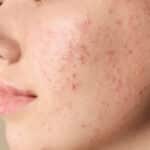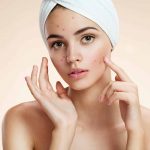Can Menopause Cause Rosacea?
Menopause is well known for its challenges – especially those face-reddening, skin-drenching bouts of heat known as hot flashes. Because rosacea causes skin flushing, often looking similar to a hot flash, many women going through “the change” might ask, “Did menopause cause my rosacea?” At Dermatology Consultants of Short Hills, we often treat people with rosacea, including many who are traversing menopause and wondering the very same thing. Today’s blog explores that subject and tells you how we can help with rosacea.
How Menopause Can Trigger Rosacea
Your hormone levels change dramatically in menopause, particularly a sharp drop in estrogen. This shift can lead to many skin changes, including increased sensitivity and a tendency toward inflammation. About three-quarters of menopausal women experience hot flashes, in which it’s common to feel an overpowering sense of heat, along with facial flushing, sweating, and sometimes other symptoms like a rapid heartbeat. But is that enough to trigger rosacea?
Recent research shows that it’s possible. One major study concluded that menopausal flushing may trigger or worsen rosacea. Research is ongoing, but the general theory is that menopause flushing causes extreme overstimulation of the skin’s blood vessels, which might contribute to rosacea. Many women develop rosacea for the first time during menopause, even if they’re never had symptoms before.
Treatment Options for Rosacea During Menopause
We recommend a comprehensive approach for rosacea during menopause. While topical and oral medications can help, laser therapy offers the most relief for many patients. Laser light can target and destroy the overactive blood vessels that cause the redness and flushing associated with rosacea.
These treatments are safe, effective, and cause minimal discomfort. Over time, your body naturally absorbs the treated tissue, leading to a clearer complexion.
In addition, our doctors may recommend menopause-specific treatments, like hormone replacement therapy. Because rosacea may be initially triggered by the drop in estrogen during menopause, it may improve when estrogen levels are stable again. Lifestyle changes, such as layering your clothing, a healthy diet, a stable sleep routine, and regular exercise, may also help with hot flashes and other menopause symptoms.
Menopause Rosacea Relief in Short Hills, NJ
Our team customizes a treatment plan to help you comfortably manage both rosacea and menopause. Say farewell to the frustrating flushing now: Schedule an appointment by calling 973-232-6245.





